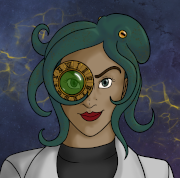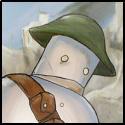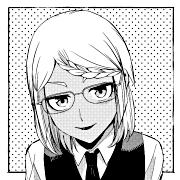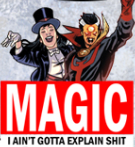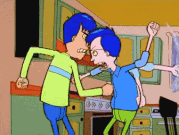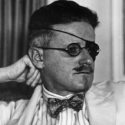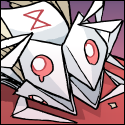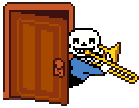|
sebmojo posted:Characterise his surroundings, belongings, and how he interacts with people. That last one especially can tell you so much about a character. I can't speak to the stupidity thing without reading a sample, but regarding your first concern: Are his motivations believable? Do the choices he makes drive the narrative, rather than him just being a "guy that stuff happens to"? If you yoinked him out of the story and replaced him with a different character who has a different personality, would the story change? If he doesn't really have any motivations and his own choices don't drive the plot and the plot would proceed along an identical path with a completely different protagonist... then yes, he may be more plot device than character. I doubt it's that bad if you're actively showing concern about this, though.  A good way to define your characters' personalities is to put them in situations where they are even moderately uncomfortable. Seeing what sets them on edge and what bothers them will let your reader know a lot. It doesn't have to be a big scene, either. Let's say you have a scene where your characters are going to Hatch the Plot. They go to a restaurant and decide to Do a Thing. If they all just go to a restaurant and have a conversation that would fulfill the need of the plot, but what about something like this? quote:Sushi wasn't Mark's first choice, but he was never one to turn down a nice meal on someone else's tab. Hikari House was decorated like most restaurants of its type: expensive faux-Japanese furnishings, lots of teak, intimate lighting. It was exactly what he expected when Eller first invited him. Pardon my lovely example, but here we have a snippet that reveals a lot about our main character in spite of the third person narration: Mark is poorer than Eller and doesn't mind sponging off him. He has a certain amount of disdain for the setting that transfers over to Eller, too, when you take into account that he was 'expecting' somewhere he seems kinda disdainful of. We also get a sprinkle of misogyny. We can see that Goody showing up in jeans makes Mark more comfortable. So why is Mark here? Clearly Eller has something he wants, or perhaps Eller is someone he can't say no to. I know I just wrote like way too many words to say "yep what sebmojo said" but I hope it helps regardless.
|
|
|
|

|
| # ? May 29, 2024 17:57 |
|
Anonymous Robot posted:Anybody have any tips for working characterization naturally into a 3rd-person narrative without info-dumping or meandering from driving the narrative forward? I have a protagonist with a goal and an obstacle, and he undergoes a change in encountering it, but the reader doesn't currently get a lot of interiority from him, and because of this I'm concerned that 1) he comes off as a device for driving the plot rails forward and 2) he comes off as stupid, when he shouldn't. You get to know people by hanging out with them and observing them, not by being given a personal essay upon first meeting. That's how readers should get to know your character, too. Once you know your character and what makes them tick, start thinking about how exactly they would "show" this (even if unintentionally) in their lives, and especially in the events that occur in your novel. All actions, large and small, all words, all details, reveal something about your character. There's no tip or trick that can do that work for you. Also third-person narrative doesn't mean you can't see into the MC's head. You can absolutely portray his internal workings as they happen. It doesn't have to be an info dump. Thoughts and emotions arise naturally, and very nearly automatically when triggered by events. As long as the thoughts and emotions are relatively in context, they won't be an info-dump if you share them. Here's the first few paragraphs of the Prologue to Neil Gaiman's Neverwhere. The second paragraph is arguably something of an "info dump," but it still works, IMO. Not that this is absolute genius or anything, but it's the book that's closest to my bed that's in third-person. Neil Gaiman posted:The night before he went to London, Richard Mayhew was not enjoying himself. I think this gives a pretty decent sketch of Richard Mayhew. He is a bit awkward and unsure of himself. He doubts that his friends are really that friendly, and enjoys demonstrations that they are, and becomes suspicious when it seems that they might not. He is about to move to London and isn't totally sure about that. He will walk out of his own good-bye party to sit alone on a sidewalk. His friends won't follow him out or necessarily think to check on him. It's much more direct than what a lot of authors would write, but it's got enough rhythm and interesting details that it works. It would not work as well, for example, to just write "Richard Mayhew felt a little bit anxious about his impending move to London." It would also not work as well to try to show the whole scene, him actually reading the cards, receiving the hugs, being presented with the umbrella, drinking every pint, going outside, cutting back to the friends still drinking and having a good time, showing him sit down on the sidewalk, etc.
|
|
|
|
Thank you all for the help.
|
|
|
|
Meinberg posted:Option B is outlining. There are lots of way of outlining. One I've recently come across that I'd like to try is to write out the major scenes you want on an index card, then lay them out in order. Then, write index cards for the scenes needed to connect those scenes together. Then, you can go and write those scenes one at a time. For longer novels (100K+ words) this is the option I use and I love it. Less than that and I can usually get away with discovery writing.
|
|
|
|
Cpt. Mahatma Gandhi posted:For longer novels (100K+ words) this is the option I use and I love it. Less than that and I can usually get away with discovery writing. I like to discovery write an outline. It's pretty much just like discovery writing only I don't bother to include any details that don't just pop into my mind or worry about what words I'm using. Here's an example (notice that this is not even close to being a real scene, the words are awful, everything is a sketchy tell, BUT it covers most of the beats in the scene). Never put "he's all like ohhhhh poo poo, of course" into your end product: DrK posted:Michael arrives outside of a coffee shop near [College]. He knows he is within about 500 feet of the poet. He waits in the coffee shop, and finds himself attracted to Alex (without realizing who she is.) He eventually moves closer to her to talk to her. Makes her jump and she spills her tea over some of her poetry. He quickly snatches them up and magically dries them off so they don’t run too badly. Then he reads her poem, thinks it’s pretty good, but she is hiding back. She doesn’t care what he thinks. Maybe they discuss poetry. Here is the very rough draft of the first bit of that scene written out (you can see some stuff has changed, and it is still quite bad) DrK posted:
This snippet still needs quite a lot of editing to bring it up to snuff, but it's enough to start editing, unlike the first quote, which is just a bit of outline. In both these examples you can also see how I handle information I don't know yet and need to research. ALL CAPS or [brackets] -- I prefer brackets because I never use them in actual text and they are easy to search for to make sure I've actually filled them all out. This technique helps me avoid rushing off to do an hour of research when I'm drafting. It also works pretty well when working on non-fiction and college papers, FYI, that's how I developed it. [CITATION GOES HERE, I THINK THIS IS IN THE ARTICLE BY BROWN?] When I get stumped, I do something similar. Here's how I described it earlier in the thread: I like to do a form of focused free writing, where I write down why what I'm writing is frustrating me. Usually it's because I don't know a bunch of stuff that I need to know to make any progress on the actual story. So I'll write a bunch ABOUT my story, but without trying to actually find the right words to put IN the story. Some people might find that this borders too closely upon "world builder's disease"--where you write a lot of history/backstory/culture notes for your story, but never manage to work on the actual story. I guess it can devolve into that, but I find that asking myself questions about what I need to know usually keeps me on track. I fix a lot of problems this way, and it gets me excited and interested in the story again. I've resolved a lot of big plot and character issues in my writing this way. I also tend to think of bits of dialogue as I do this, because I kind of run through the story in my mind. (Full Disclosure: Still suck at finishing a project though!) Here's an example from a few days ago: quote:Neza blames herself for not protecting Gregor. Yay, I've worked out some of the emotions and motivations for my characters, and started to solidify how the inciting incident actually happens and leads to the events that follow! Two things that were not working for me that well in my first draft! Another suggestion: Dr. Kloctopussy posted:Also, take a look at "suggested" outlines. I'm a fan of the Save The Cat beat sheet, but that is by no means the ONE TRUE WAY to structure a story. But I think it is particularly helpful in getting through the often-challenging first half of Act II. I'm not saying follow it exactly, but check it out, and see if it gives you any ideas for 1) how to look at your plot for writing the condensed version, and 2) any places you can build on to add the extra words you need. You can also examine that picture of an angler fish or dragon or whatever, I think it covers a lot of the same points. Helpful links: SuBeCo posted:In terms of the plot discussion, I've found Jami Gold's worksheets really useful for figuring out the basics of plot. What I like best is that she gives example page layouts for each beat andvsection. Obviously, sticking to this rigidly and writing by numbers is probably a bad idea, but it's been very helpful for me in terms of figuring out the basics of plot. Here is one I've filled out: https://docs.google.com/spreadsheets/d/1h_qbSTqoNdws_xm-a9ALNdwlRk_-DbEXsp0QErdFHVo/pubhtml Note: I don't use examples of my own work because I think I'm super-awesome, but because I have access to them at several places in the process. I don't quote myself because I think I'm the best advice-giver in the thread, but because a) I think it's important to point out that many of these subjects have been covered in the thread, so there are a bunch more answers you can find here, and b) I remember what I've said in here better than I remember what other people have said, so my own quotes are easier to find. If you click on the links to the prior posts, you are likely to find a very good discussion of the topic you are asking about, with many more opinions and great advice. Dr. Kloctopussy fucked around with this message at 22:18 on Jul 25, 2014 |
|
|
|
Oh hey, I just realized that I already posted that Neil Gaiman quote earlier in the thread--I should really move some new books onto my nightstand; I read that one nearly a year ago. In any case, here is a link to that post, which also includes quotes from Chandler and a YA fantasy novel (Chalice by Robin McKinley). We were discussing sentence structures at that point, but it includes a couple more examples of introducing and describing characters (which is part of working characterization into the story). http://forums.somethingawful.com/showthread.php?threadid=3495955&userid=35993&perpage=40&pagenumber=2#post427758364 And here's another one where we were talking specifically about describing characters: http://forums.somethingawful.com/showthread.php?threadid=3495955&userid=35993&perpage=40&pagenumber=1#post414845010 Also I cannot say this enough: When you have questions, look at your favorite books. Dr. Kloctopussy posted:Reading books, especially when looking for something in particular, is like taking a master class on different ways to apply the guidelines. It puts tools in your tool box and helps you to develop an intuitive sense of how the guidelines work. Whenever I pull quotes from books like I didim these quoted posts, I learn so much. It is a completely different experience than just reading the book like I normally do. I pay much more attention to how those specific words accomplish a specific purpose. I actually type them out by hand, and I remember reading that other well-known authors have used the same technique, copying passages from their favorite books long-hand. [FIND CITATION] The recommendation to read more is given over and over in this thread, and it is because it works. It is literally the only piece of advice about how to use words to communicate powerfully. It won't tell you about process or publication, but nearly every other question can be found in the works of fiction that you love. (There are books about process and publishing, too). My point isn't that you shouldn't post questions here, but that a wealth of advice, from published authors of all kinds, can be found on your shelves.
|
|
|
|
Dr. Kloctopussy posted:I remember reading that other well-known authors have used the same technique, copying passages from their favorite books long-hand. [FIND CITATION] Here: http://www.artofmanliness.com/2014/03/26/want-to-become-a-better-writer-copy-the-work-of-others/ Full disclosure: I have yet to try this myself, because I've been looking for just the right book.
|
|
|
|
I'm writing a novel by hand. It's the first time I've ever written fiction longhand in a very long time, certainly the first time since I began taking writing seriously. I do have a problem, though. I don't always like to write my story sequentially, especially in cases like my current one where different plot lines are beginning to develop and don't impact each other right away. So, when I get stuck on one, it's nice to be able to tinker with another. On the computer, that's simple, but when writing in composition notebooks, not so much. Any tips on keeping things straight in a situation like this? I mean, comp notebooks are $0.50 at my local grocery store, so I could just have a bunch of them and bounce around, but that might be even more confusing. Also, I don't recall reading a longhand vs typing discussion in this thread (though it's been a while since it was started). If there hasn't been one, anyone care to weigh in? I'm really enjoying it, especially being able to carry my story with me wherever I go, or taking long trips to the park to work. Transcribing it onto the computer for the crit group sucks, though.
|
|
|
|
blue squares posted:I'm writing a novel by hand. It's the first time I've ever written fiction longhand in a very long time, certainly the first time since I began taking writing seriously. I do have a problem, though. I don't always like to write my story sequentially, especially in cases like my current one where different plot lines are beginning to develop and don't impact each other right away. So, when I get stuck on one, it's nice to be able to tinker with another. On the computer, that's simple, but when writing in composition notebooks, not so much. Have you thought about using a notecard system? Maybe use as something to keep track of major plot developments. They sell multicolored packs and maybe you can use that as key (like same color mark at the top of an associated page) Your method sounds interesting to me. Not the longhand, but the write mostly one plotline, kinda lose steam, so tackle another, and so on. Have you thought of keeping track where you make those jumps? I wonder if in the final narrative it would make sense to use those breaks as natural jumps from one plot to the other. Proteus Jones fucked around with this message at 07:26 on Jul 27, 2014 |
|
|
|
Could I ask why you've chosen to hand write?
|
|
|
|
flosofl posted:Have you thought of keeping track where you make those jumps? I wonder if in the final narrative it would make sense to use those breaks as natural jumps from one plot to the other. Anonymous Robot posted:Could I ask why you've chosen to hand write? I've been reading a lot of articles about the cognitive and creative benefits of longhand and how many authors, even today, continue to do so. I decided to try it out for fun and I have really been enjoying it. I can carry my novel with me everywhere I go. Sitting in the park and writing on a notebook is a great experience. I'm also very, very ADHD and impulsive, and I have a very, very hard time controlling myself when I start to get distracted. I have no willpower. blue squares fucked around with this message at 07:58 on Jul 27, 2014 |
|
|
|
Don't worry about it too much; hop wherever you want and when it's too confusing, rip the pages out and put them in a binder so you can reorder them at will and use page marker sticky notes to keep track of things. I don't really recommend writing in the binder, though, because the pages rip too easily.
|
|
|
|
I have a passion project that I have had for almost 10 years now. It is a sci-fi graphic novel series. I want to get serious about this project now, but I am still stuck in the world building and planning stages. I have a general idea how the plot will work, I'm still undecided about many world-building aspects, and one of the four main characters is still a blank slate. (I know what this character's importance to the story is, but it depends on parts of the world that I haven't developed yet.) This is a really big story, and I feel like I'm lost. I do have some organization; I have a story bible on my Google Docs with everything I know about the story so far. I've come a long way in developing this, from what it used to be just a few years ago, but I still have major holes that need to be filled. But I just feel directionless, like I don't know where to go, even though I kind of do. Anyone have advice on large world building? Where to start first, what to focus on, what is most important?
|
|
|
|
Revol posted:I have a passion project that I have had for almost 10 years now. It is a sci-fi graphic novel series. I want to get serious about this project now, but I am still stuck in the world building and planning stages. I have a general idea how the plot will work, I'm still undecided about many world-building aspects, and one of the four main characters is still a blank slate. (I know what this character's importance to the story is, but it depends on parts of the world that I haven't developed yet.) This is a really big story, and I feel like I'm lost. I do have some organization; I have a story bible on my Google Docs with everything I know about the story so far. Who is drawing it?
|
|
|
|
Stop wordbuilding and start writing. See what comes out. Finish it, then go back and change things over and over until you have it just the way you like it. Anyone can wordbuild. The fact that you have been doing it for so long. A tiny percentage of those people actually write their stories.
|
|
|
|
blue squares posted:Stop wordbuilding and start writing. See what comes out. Finish it, then go back and change things over and over until you have it just the way you like it. Anyone can wordbuild. The fact that you have been doing it for so long. A tiny percentage of those people actually write their stories. Yeah, that's obviously a big concern of mine. I have been thinking of both writing and drawing single issue short stories in this universe, as a way to help get going. ravenkult posted:Who is drawing it? Nobody yet. That's really the biggest obstacle, finding an artist partner.
|
|
|
|
The biggest obstacle is writing it. World building is easy and endless and often sterile. Write!
|
|
|
|
Revol posted:Nobody yet. That's really the biggest obstacle, finding an artist partner. But you won't be able to find one as you are right now. You need to finish a story that you can pitch to artists--worlds are only as interesting as their stories. Having an actual something they could read is better than just telling them "I have a cool world," because it's not just a one-way street, they're probably looking for a good writer to work with, too!
|
|
|
|
blue squares posted:I've been reading a lot of articles about the cognitive and creative benefits of longhand and how many authors, even today, continue to do so. I decided to try it out for fun and I have really been enjoying it. I can carry my novel with me everywhere I go. Sitting in the park and writing on a notebook is a great experience. I'm also very, very ADHD and impulsive, and I have a very, very hard time controlling myself when I start to get distracted. I have no willpower. It helps with my distraction issues like crazy. My writing "kit" went from being half a dozen word files and tumblr and something awful open in other tabs to a lined notepad, some nice pens, fluorescent post-it tab markers, my Alphasmart and a folder that fits all that. Again, not a replacement for pad-and-pen, it's just stupidly helpful.
|
|
|
|
I love writing longhand, and I have about five fountain pens floating around the house (along with a few disposable ones) for just that purpose. In fact, right now I'm busy typing up a vampire novel I started last fall, but didn't finish. Part of that's just to catch myself up with my own plot--it's been so long I forgot large chunks of it. But in general, I find when I write something by hand first, I'm a lot more confident in my style once it's typed. I'm also going to try transcribing some stuff, see how that works out.
|
|
|
|
Q: I've been worldbuilding my setting for a while now and- A: Stop. Go to Word. Go directly to Word. Do not pass the Wikia creation form. Do not collect 200 pages of poo poo nobody cares about. I'm assuming here that this project dates from uni/college or later. If it dates from high school or earlier, abandon it immediately. Peel fucked around with this message at 11:23 on Jul 28, 2014 |
|
|
|
Revol posted:
Do you really need to make this project a graphic novel? It might be better to just make it a regular novel then start writing it as you were advised. Because if you are working on a project on a decently sized scale, hiring an artist (yes hire, you do need to pay artists) can be a bit of an undertaking. Also without earlier completed projects, it is going to be hard to entice a good artist to your cause in the first case. You'll want someone who isn't a flake and is skilled enough to effectively communicate what you want to communicate visually. Those artists tend to cost more and are also choosier about the projects they involve themselves in. Comics take a long loving time to make so you need to keep all this in mind. The other option would be to learn how to draw. That is not a bad option if you really enjoy comics anyways but it would take time away from your writing. So a novel would probably be most prudent to get your project done in a reasonable amount of time. If it's a hit, you can always do a comic version later or a comic in the same setting. Having completed successful work will also make it easier to do collaborations, especially if you can get it published somewhere.
|
|
|
|
If you've been working on it for ten years and all you can say for it first is "worldbuilding," move on. Speaking as someone who draws, though I haven't done a comic, no one is going to agree to illustrate a graphic novel when there is no novel to graph. Ten years and you don't even know one of the characters yet. You know what will let you figure that out? Writing. e: I have two video game ideas. Well, three, I guess. I know it's not even worth considering any of them until I write the plots at the absolute minimum, and I would really need to also include weapon and item stuff in the case of an RPG, write branching paths, dialogue, optional scenes, etc. And then learn RPG Maker at the very least (one could be done in Renpy, at least as a rough concept, the other is way too ambitious for me to make alone), then graphic assets, music... Not getting anywhere with any of them without a complete storyboard to either work off of myself or pitch to someone. Echo Cian fucked around with this message at 15:34 on Jul 28, 2014 |
|
|
|
Does having teenage characters in a novel automatically make it a "YA" novel? I'm currently in the process of writing a paranormal mystery novel that takes place in a small New England town where teenagers are mysteriously vanishing. It's third person omniscient and the focus is split between an FBI agent called in to investigate the disappearances and a group of teens who are after-school paranormal investigators. Think "Twin Peaks" meets "Buffy" with a Cthulu-style cult as the central antagonists. I am a member of a writing group and some of them told me that this makes it an exclusively adult novel by the mere presence of an adult MC alone, while others have insisted the presence of the teen characters and the focus on the teenagers makes it a YA novel. I guess what I'd be going for is a cross-age appeal thing but some have told me that I would need to focus at least 80% one way or risk isolating both audiences. Opinions? Captain Mog fucked around with this message at 16:42 on Jul 28, 2014 |
|
|
|
quote:Think "Twin Peaks" meets "Buffy" with a Cthulu-style cult as the central antagonists. This part alone makes it sound like YA to me. Keep in mind that a lot of YA stuff is pretty "dark," like the entire premise of Hunger Games isn't even approaching cheery.
|
|
|
|
Captain Mog posted:Does having teenage characters in a novel automatically make it a "YA" novel? I'm currently in the process of writing a paranormal mystery novel that takes place in a small New England town where teenagers are mysteriously vanishing. It's third person omniscient and the focus is split between an FBI agent called in to investigate the disappearances and a group of teens who are after-school paranormal investigators. Think "Twin Peaks" meets "Buffy" with a Cthulu-style cult as the central antagonists. I am a member of a writing group and some of them told me that this makes it an exclusively adult novel by the mere presence of an adult MC alone, while others have insisted the presence of the teen characters and the focus on the teenagers makes it a YA novel. I guess what I'd be going for is a cross-age appeal thing but some have told me that I would need to focus at least 80% one way or risk isolating both audiences. Not sure about the genre conventions, but it doesn't have to be YA. Off the top of my head, both 'The Lovely Bones' and 'The Little Friend' have teen/tween mains. Of course, there are enough adults reading YA these days to almost make it a moot point. Unless you're invested in having extremely adult things happen (I'm thinking It and Anne Rice softcore porn-ish) I'd shoot for YA. Again, not my genre, so take a big bit of salt with that.
|
|
|
|
Captain Mog posted:Does having teenage characters in a novel automatically make it a "YA" novel? I'm currently in the process of writing a paranormal mystery novel that takes place in a small New England town where teenagers are mysteriously vanishing. It's third person omniscient and the focus is split between an FBI agent called in to investigate the disappearances and a group of teens who are after-school paranormal investigators. Think "Twin Peaks" meets "Buffy" with a Cthulu-style cult as the central antagonists. I am a member of a writing group and some of them told me that this makes it an exclusively adult novel by the mere presence of an adult MC alone, while others have insisted the presence of the teen characters and the focus on the teenagers makes it a YA novel. I guess what I'd be going for is a cross-age appeal thing but some have told me that I would need to focus at least 80% one way or risk isolating both audiences. I don't have opinions but I'd beta read that.
|
|
|
|
Thank you all for the replies. I don't mind so much if it does turn out to be YA in the end, since I know most horror fans usually have the same tastes regardless of age. In fact, "YA" might be more appropriate since teenage audiences often respond better to horror/comedy fare than "mainstream" audiences do and it isn't really possible to write a book with a premise such as this without having plenty of dark humor. ravenkult posted:I don't have opinions but I'd beta read that. Sweet, glad you like the idea!
|
|
|
|
Oh man, somehow I missed the '10' before the years. Abandon it now. It's stagnant garbage. Work on something new, write some complete, coherent tales that don't need ten years of work. When you're done with those you can return to your Passion Project but you won't want to because you'll be a better writer who can see all the things wrong with it. Whatever's salvageable you can fish out to use in better stories.
|
|
|
|
My own experience with horror and YA. For a few months I asked agents on twitter to give me some clue as to the difference between YA horror, and horror horror. Answers were all over the place. Some agents wanted YA horror to be Scooby Doo, where there's a scare, but it turns out to be the gardener in a mask, and nobody's hurt. I learned that YA now seems to mean as young as tweeners, (6th grade wtf?), which is why there's now NEW Adult, which is 17-21. But again - it's all open to interpretation. I pitched my story to some of them, (yes with a godawful query) and because there's a serial killer who kills people in the story, boom, it's not YA. But... what about Hunger Games? People get killed in those books, right? I think the challenge with first-time authors and YA is that you can't make the rules, you can't bend the rules. I actually considered re-writing the scenes, so the chapter just kind of fades to black when the guy whips out his knife. But in the end, I wanted to just write my drat story and finish it. I still want that. Once this one's done, if I set out to write a YA book next time, I'll have a clue about the boundaries. And for an update, yes! I'm writing. I hope to be complete with this rewrite by the end of August, so it's put to bed, and then me and my editor go through to make all the tweaks.
|
|
|
|
magnificent7 posted:My own experience with horror and YA. For a few months I asked agents on twitter to give me some clue as to the difference between YA horror, and horror horror. Answers were all over the place. Some agents wanted YA horror to be Scooby Doo, where there's a scare, but it turns out to be the gardener in a mask, and nobody's hurt. If there's one thing I have learned from my writing classes in college and conversations with professors, it's that nobody has any idea what YA is supposed to be anymore. It's changed so much over the past decade since the advent of Harry Potter & the dreaded T-word book that it's impossible to pin it down, exactly. It used to be universally regarded as a pulpy genre with no literary merit whatsoever but that also seems to be changing with works like THG & Perks of Being a Wallflower. At the same time, the PNR-wave has died down completely and YA dystopia is so dead that nobody wants to touch it. There's also this big movement to get more guys to read (which they aren't because about 90% of YA novels are geared towards girls). So there seems to be a big feeling of "where do we go from here?" Again, this is what I've gleaned from a few professors I know who sold YA books so take it with a grain of salt. I also suspect that some agents are a bit too scared of pushing the envelope with publishers and offending someone's sensibilities, which is why you get a lot of the "oh no not TOO graphic" stuff. That's funny to me because I can't think of any teenager who would've been shocked by gore and sex in a book when I went to high school. In fact, my parents always encouraged me to read whatever the hell I wanted even if it was explicit in nature and I know I wasn't alone in that. Maybe it's a broad fear of censorship? I realize controversy can be a death knell for some YA books. Captain Mog fucked around with this message at 20:50 on Jul 28, 2014 |
|
|
|
Captain Mog posted:Does having teenage characters in a novel automatically make it a "YA" novel? I'm currently in the process of writing a paranormal mystery novel that takes place in a small New England town where teenagers are mysteriously vanishing. It's third person omniscient and the focus is split between an FBI agent called in to investigate the disappearances and a group of teens who are after-school paranormal investigators. Think "Twin Peaks" meets "Buffy" with a Cthulu-style cult as the central antagonists. I am a member of a writing group and some of them told me that this makes it an exclusively adult novel by the mere presence of an adult MC alone, while others have insisted the presence of the teen characters and the focus on the teenagers makes it a YA novel. I guess what I'd be going for is a cross-age appeal thing but some have told me that I would need to focus at least 80% one way or risk isolating both audiences. Don't worry about the genre right now. YA vs. Adult isn't really based on the age of characters, especially if you have characters in both age groups. It probably has more to do with the themes and whether adults would want to read it, or if agents/editors think that the market for the book is teens/tweens. Middle Grade/Young Adult/New Adult/"normal" has more to do with which shelf your book is on in a store than anything else. There are no hard rules. My understanding (from reading the internet, so I am totally an expert) is that Middle Grade books tend to have protagonists between 11 and 13, YA is 14-17, and I guess NA is 17-22, though I would expect it to be more like 18, since I think it is basically the "college" story. Note that those are protagonist ages, not reader ages. Young readers tend to read "up" and almost never down (so a 16 year old will read about 17-21, but NOT about a 12 year old). There's obviously some exceptions (there are exceptions to every single rule, just add that in after every single thing anyone says about rules or guidelines or whatever else). Here's a link to a google search that at least explains some of the differences between YA and Middle Grade, which might also be helpful for seeing the kind of themes and conflicts that are commonly associated with YA fiction. If you want to tilt your book that direction, some of the articles might provide some guidance. https://www.google.com/search?client=safari&rls=en&q=middle+grade+YA+new+adult&ie=UTF-8&oe=UTF-8 Other than that, just write it and see what happens. I would also beta-read this for you. re: longhand writing, I'm in the fountain pen camp as well. I enjoy the physical process of writing. I have about 15 pens inked up, and 50 some ink samples in different colors. That is a bit extreme, but I really enjoy it. I also find that ideas flow more casually when I write by hand than trying to type onto a blank document. I can get a similar flow going if I am chatting with someone, but very few people want to hang out while I type a bunch of long posts about my imaginary people into a chat. And it mysteriously doesn't work if it's just me. I need someone to sit there and be like "hmmm, I see." For organizing handwritten stuff in composition notebooks: Leave the first 3 pages blank and make a Table of Contents as you go.
|
|
|
|
Revol posted:Nobody yet. That's really the biggest obstacle, finding an artist partner. Like other people have said, the best thing to do is to stop worldbuilding and start writing, and it probably isn't a bad idea to find a new idea that doesn't have ten years of baggage to do that with. One thing I will say, though, is that if you're absolutely attached to writing a comic, don't let "oh I don't have an artist" stop you from writing the comic. You can write a script all on your own without any artistic skill whatsoever, and even though it'll probably end up being more-or-less unusable if you ever did find an artist, at least you'll have an actual story that's actually been written. Honestly, I'm in a similar boat. I really like graphic novels as a medium; I think they're a great way to tell stories that wouldn't be effective or possible in other mediums, there's a lot of room to have fun with the format, and I'd absolutely love to work with them. However, without an artist or any artistic ability of your own, it's ultimately not a medium you can do anything with past the script stage, which--as much as you might polish it--will never really be a finished product. Learning to draw is a definite option here, and if you're really attached to comics, it's 100% the best option you have. It's a skill you'll have to develop with a lot of time and effort, though, and if you can't or won't put in the effort there, you'll have to double down on writing, which is also a skill you have to develop with a lot of time and effort. (Time and effort are the most important parts of this process no matter what you do; I'm a lazy poo poo who's being 100% loving hypocritical even saying that, but we both know it's the absolute truth.) And if you're going to focus in on just writing instead of art and writing, well, you'll probably have to give up on comics for the time being. That doesn't mean you don't write comics--in fact, if writing comics is your ultimate goal, you should first start writing comics and then never stop--but realize you're probably going to need to focus on getting some decent pieces of finished prose fiction under your belt before you can do anything with those scripts. You may not find that prospect as exciting/flashy/fun as doing comics, but it'll build your skills and give you something to impress these artists you'll one day want to hire with. You need to prove you can write a compelling, complete story, and the only way to prove that is to actually do it.
|
|
|
|
So, we've got this crit group and some of us are working on novels, posting them as we go, and frankly I'm not sure if that's a good thing. Writing advice everywhere tends to agree that a piece should be finished before exposing it to outside eyes. As Stephen King said, write with the door closed, revise with the door open. I think it might be best to finish the first draft and do an entire second draft before letting anyone see it, because I don't even know what the story is, yet. Entire characters and chapters could be rewritten or cut. I think I should stop posting my novel until I'm ready for outside feedback. Thoughts?
|
|
|
|
blue squares posted:So, we've got this crit group and some of us are working on novels, posting them as we go, and frankly I'm not sure if that's a good thing. Writing advice everywhere tends to agree that a piece should be finished before exposing it to outside eyes. As Stephen King said, write with the door closed, revise with the door open. I think it might be best to finish the first draft and do an entire second draft before letting anyone see it, because I don't even know what the story is, yet. Entire characters and chapters could be rewritten or cut. I think I should stop posting my novel until I'm ready for outside feedback. Thoughts? This is exactly what I said when we talked about the group format edit: I think seeing corrections as you go helps SOME people, but from what I've seen of doing this crit group I think it makes most people stop writing and fret about poo poo that shouldn't matter in a first draft.
|
|
|
|
systran posted:This is exactly what I said when we talked about the group format Hah. For what it's worth I think I'm confident in myself that I'm not going to fall into a death-spiral of editing, and I have so much fun when I'm writing novels (unlike short stories, which is what I was doing when I posted about dragging myself to the computer every day. I think I'm not meant to write shorts, despite publishing a couple). Still, the feedback could get into my thought process too early and mess with my creativity. The positive comments do feel great, but overall there's probably more harm than good there. I may post some excerpts from my story from time to time, if I write something that will work alone, since I might be including little vignettes in there from time to time. Not sure.
|
|
|
|
Do what muffin did and finish a draft, then post the first revision for the group.
|
|
|
|
Hopefully the group is still going when I'm at that point. I'm about to start a real busy semester of school, writing wise, and it'll likely stay that way. I'm double-majoring in Rhetoric and Philosophy.
|
|
|
|
I hope it's still going too! For what it's worth, when I was posting my novel rough draft scene-by-scene, I didn't have any issues with other people's input harshing my creativity. It was more like, I had this big exciting idea, and having people on my shoulder along the way kept me from wandering off into bad exposition or pointless dialog at every turn. But. Anyone who is interested in posting any length of fiction is still welcome to join us at: http://writergoons.jcink.net/
|
|
|
|

|
| # ? May 29, 2024 17:57 |
|
Yeah, that feels like a personal thing. If only there were a right way and wrong way to do this, this would all be so much easier. e: Though honestly I've been focusing a little bit more on reading the shorts a bit more... maybe that's because that's just what I've been putting up though, idk. neongrey fucked around with this message at 23:28 on Jul 30, 2014 |
|
|





